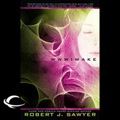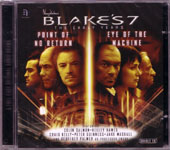
 WWW: Wake
WWW: Wake
By Robert J. Sawyer; Read by Jessica Almasy, Jennifer Van Dyck, A. C. Fellner, Marc Vietor, and Robert J. Sawyer
Audible Download – 12 hours 13 minutes [UNABRIDGED]
Publisher: Audible Frontiers
Published: 2009
Themes: / Science Fiction / Artificial Intelligence / Cyberpunk / Cybernetic Implants / Technothriller / Consciousness /
I don’t normally inject personal anecdotes or experiences into my reviews. It just isn’t my style. In the case of WWW: Wake, however, I simply can’t resist. I’m legally blind, and Robert J. Sawyer’s latest novel concerns itself with ways of seeing, in both the purely physical sense and in more metaphorical ways. It tells the story of 15-year-old blind math genius Caitlin Decter, whose family has just relocated from Austin, Texas to Waterloo, Ontario. She receives an email from a scientist in Tokyo who believes he can restore her sight by means of a behind-the-eye implant linked via Bluetooth to a pocket-sized transmitter and decoder which the ever-witty Decter dubs her “Eye-Pod”. Instead of seeing the real world, Caitlin initially sees only a kaleidoscope of criss-crossing lines and circles transposed on a flashing checkerboard of seemingly random lights. After some initial puzzlement, researchers determine that Decter is actually seeing the inner workings of the World Wide Web.
This premise is already intriguing enough, but add to it a nascent consciousness growing inside the raw data transmitted through cyberspace, and you have the makings of a great technothriller. Fortunately, Sawyer’s writing doesn’t fall victim to many of the clichéd tropes of that genre. There’s very little in the way of the sensationalism of films like Lawnmower Man or Ghost In The Machine. Instead, Sawyer explores the philosophical implications of a growing, learning artificial intelligence. Meanwhile, of course, Caitlin Decter must come to grips with her new “web sight”, as she calls it, in addition to facing the normal teenage challenges of adjusting to a new high school.
WWW: Wake strikes a good balance between the cerebral and the emotional. The novel stops just short of qualifying as “hard science fiction”, but it also, as I said, shies away from becoming a popcorn thriller. Decter is a complex and ultimately likable character. She’s a brilliant mathematician–in the online world she goes by the alias Calculass–and she’s confident in her mental prowess, but at the same time she faces the insecurities caused by her blindness in addition to the standard turbulence of adolescence. The supporting cast of characters in Caitlin’s life are just as three-dimensional. Her mother is loving and generous, while her father, a theoretical physicist, is well-meaning but emotionally distant. The interactions and conflicts between the characters are subtly portrayed, lending WWW: Wake a sense of realism despite the bizarre goings-on behind Caitlin’s eyes.
Is Caitlin’s blindness realistic? This is where my own personal experience comes into play. I’ve been legally blind since birth, although since I have some residual vision the comparison isn’t exact. Even so, it’s evident to me that Robert J. Sawyer has done his homework in this regard. Caitlin’s life is replete with all the trappings associated with blind life: white canes (which I just traded in for my first guide dog), text-to-speech screen-reading software, and braille displays. More importantly, Sawyer understands how the world is conceived and constructed for those of us with either no vision or limited vision. This becomes apparent as Caitlin’s sight changes throughout the novel in interesting ways, and as she struggles to pin names and concepts to the new visual stimuli that are firing down her optic nerves.
The Audible Frontiers production of Wake is stellar in its production value. As the voice of Caitlin Decter, Jessica Almasy does most of the heavy lifting, and her performance shines. Sound and voice is especially important in the world view of a character who, through much of the novel, lacks any kind of visual stimuli, and Almasy deftly handles these complex nuances. Of course, Decter is also a precocious and spunky teenage girl, and Almasy rises to the challenge of matching Decter’s dynamic character. The other narrators also do an excellent job, and Sawyer himself even lends his voice to occasional passages.
The book’s one weakness lies in its plotting. Along with Caitlin’s story and the development of the “web consciousness”, two other storylines weave in and out of the novel. While they’re interesting in their own right, they never come to a satisfying conclusion and never intersect in a meaningful way with the main story. I understand that Wake is merely the first in the WWW trilogy of novels, and that Sawyer will likely resolve them in upcoming volumes. Still, an author as talented as Sawyer should be able to bring these narrative threads to enough of a climax to maintain the novel’s cohesion.
Minor structural shortcomings aside, WWW: Wake is both an emotionally satisfying story of a blind girl coming to grips with ways of seeing, and an intellectually stimulating examination of technology and consciousness. Along with William Gibson’s Neuromancer and Neal Stephenson’s Snow Crash,Wake presents a unique perspective on information technology. I eagerly await its sequels Watch and Wonder.
Update: I didn’t realize this at the time, but apparently I wrote this review on the birthday of Annie Sullivan, who taught the deaf-blind Hellen Keller how to communicate with the world. Sullivan is a strong symbolic and thematic presence in Wake. Coincidence, or fate?
Posted by Seth Wilson


 Hyperion
Hyperion

 Blake’s 7 – Point Of No Return and Eye Of The Machine (Vol. 1.2 & 1.3)
Blake’s 7 – Point Of No Return and Eye Of The Machine (Vol. 1.2 & 1.3) WWW: Wake
WWW: Wake


